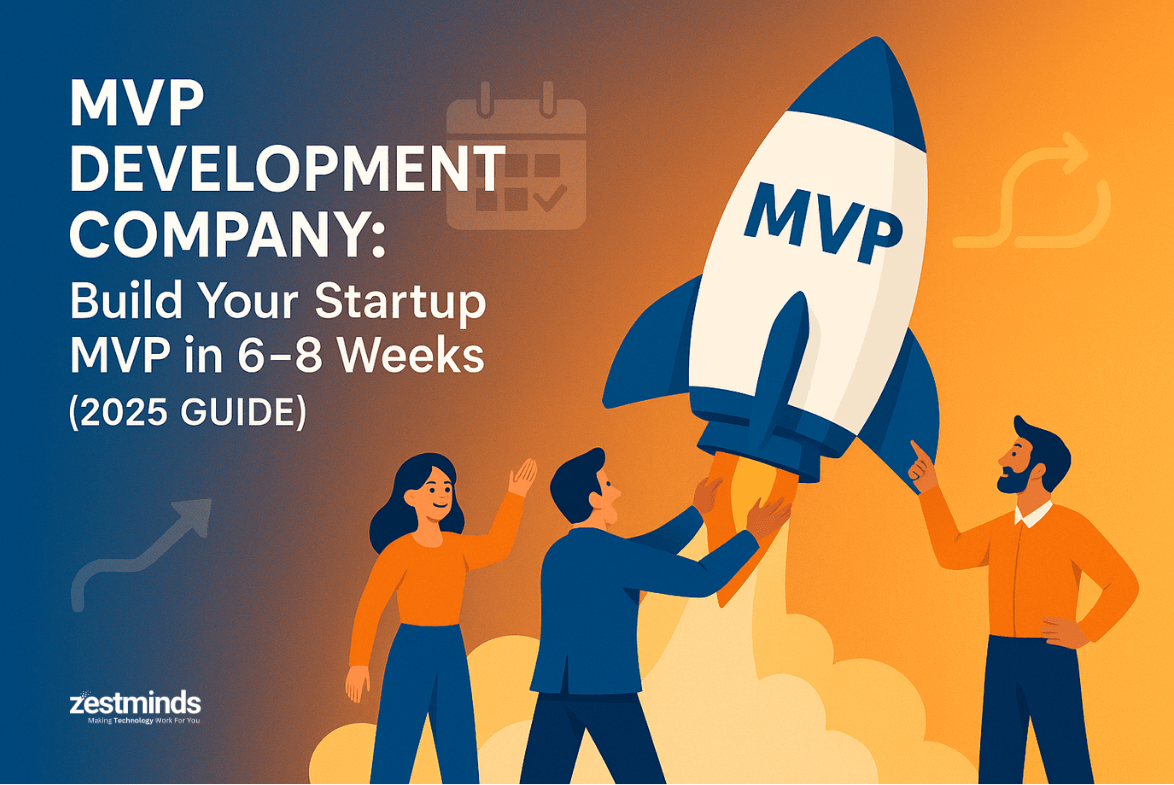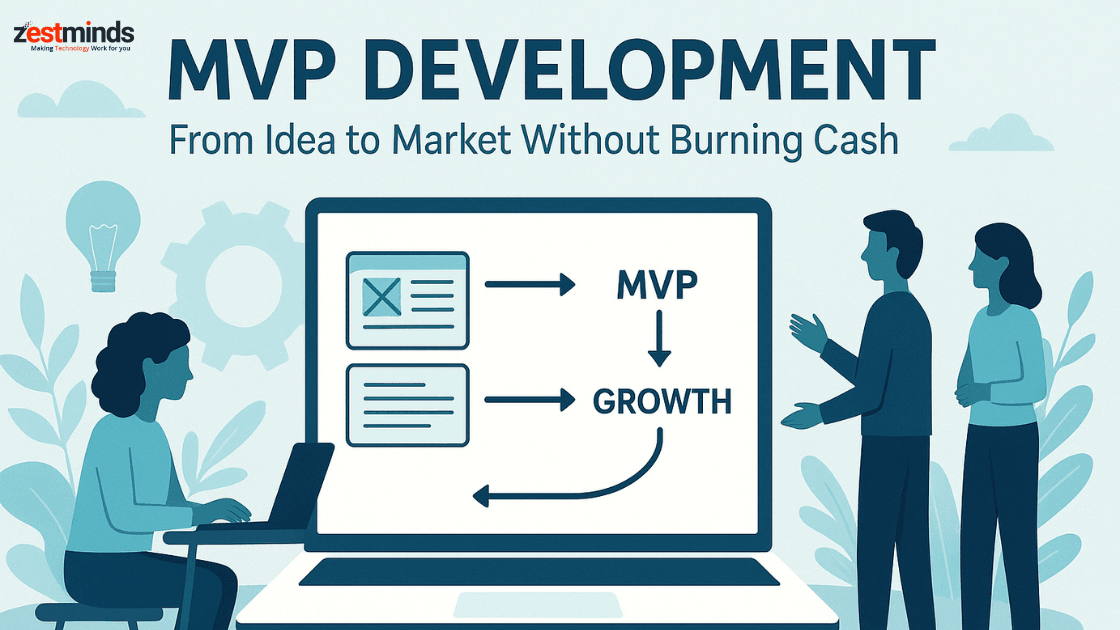MVP Development Company Checklist: 10 Things to Verify Before You Hire One
Building a Minimum Viable Product should feel like a strategic experiment, not a risky gamble. The right MVP development company helps you validate ideas quickly, stay within budget, and gain real user feedback before going all in. The wrong one wastes precious runway on code that won’t survive real-world tests. This checklist distills what hundreds of startup founders wish they’d known before hiring, backed by real results and lessons learned from Zestminds, a global AI-first software development company trusted by 40+ startups across 10+ countries.
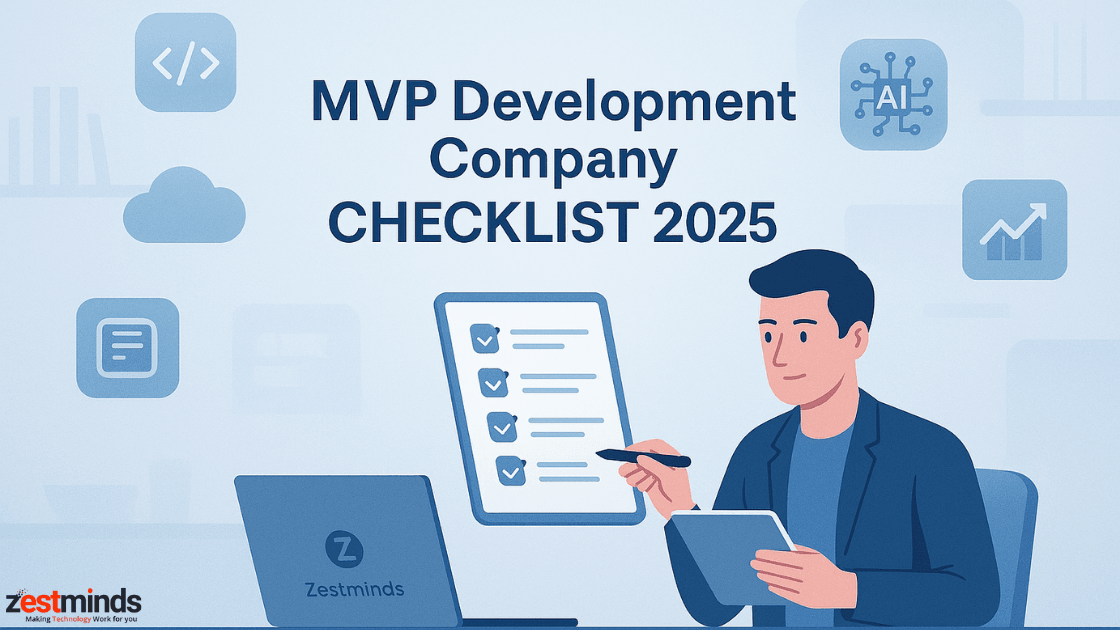
Why Choosing the Right MVP Partner Matters for Startups
Your MVP is the first public version of your dream, it’s where your vision meets real users. When built by a partner who understands product-market fit, every sprint teaches you something valuable. When built by the wrong one, it becomes a static demo that collects dust.
Think of it like hiring a seasoned mountain guide: the climb may be yours, but the rope, route, and survival instincts belong to them. You need a partner who’s summited before, someone who knows the shortcuts, the storms, and when to turn back or push forward.
What an MVP Partner Actually Does
A credible partner turns fuzzy ideas into a lean, testable product. They prioritize core features, design frictionless user flows, and set up data tracking so you can measure traction early. When done right, your MVP isn’t just a product, it’s a learning machine.
The Hidden Cost of a Wrong Partner
Every founder has heard the cautionary tale: six months of development, multiple investor pitches, and an app that crashes on its first real user test. Cheap code becomes expensive debt. Rebuilds often triple costs and momentum dies when confidence fades.
Mini Case Study: From Idea to Investment in Six Weeks
One startup approached Zestminds with only a concept and rough sketches. Within a week, we finalized scope; by week three, the prototype was in investor hands; by week six, it was live and generating user data that secured pre-seed funding. It wasn’t luck, it was discipline. (See our AdBar AI content automation case study for a similar success.)
The 10-Point MVP Company Checklist
Here’s your founder-friendly guide to evaluate any MVP development company. Keep it handy during calls, you’ll spot red flags before they become regrets.
1. Proven Portfolio with Startup Experience
Ask the golden question: "Can you show me an MVP that’s live and still running?" Longevity beats portfolios filled with static mockups. Founders should seek partners used to chaos, pivots, evolving specs, and tight deadlines.
- Review at least two live products, not password-locked demos.
- Ask what happened post-launch: Did it raise capital, scale, or pivot?
- Benchmark professionalism with our AI-powered booking platform case study.
Mini Summary: Real startups. Real results. If they can’t prove it, they probably haven’t done it.
2. Technical Expertise in AI, Cloud, and API-First Design
Even if you’re not building an AI product today, your MVP should be AI-ready. A future-proof partner uses frameworks like FastAPI, React, and Laravel with modular APIs and clean architecture. Avoid rigid systems that turn scaling into surgery.
- Request a one-page architecture diagram with data flow.
- Ask how they structure APIs and isolate business logic.
- Check if they deploy to cloud environments like AWS or GCP.
Pro Insight: Zestminds uses a "future toggles" method, keeping hooks ready for AI features without bloating the MVP. It’s why our clients scale faster when the market shifts.
3. Product Thinking and UX Maturity
Code delivers functionality; UX delivers validation. The best MVP companies think like product strategists, not coders-for-hire. They obsess over the user’s first "aha!" moment and define success in metrics, not modules.
- Expect user journeys, clickable prototypes, and event tracking.
- Ask for UX KPIs like activation or retention before they start coding.
- Explore Zestminds’ AI MVP Planning Checklist for practical UX steps.
Storytelling Moment: We once rebuilt a fintech MVP that looked "beautiful" but had 12 steps before a user could register. After simplifying to 3 steps, activation jumped 70 %. Great UX pays for itself.
4. Lean Process and Agile Sprint Management
Time is a startup’s most expensive currency. A genuine agile partner focuses on progress, not promises. Weekly demos, flexible sprints, and open dashboards are signs of maturity. If you only see "we’ll update you next month," run.
- Ask to see their sprint dashboard, transparency is culture.
- Review a sample "Definition of Done."
- Look for rhythm: short sprints, frequent check-ins, honest retros.
Callout: At Zestminds, founders see progress live on Jira or ClickUp dashboards, no surprises, no vague "in progress" labels.
5. Tech Stack Flexibility (React, Laravel, FastAPI, Flutter)
Rigid tech choices sink early-stage products. You need a team that balances current goals with future flexibility. Ask how they’ll future-proof your stack for new integrations or hiring ease.
- Confirm their stance on avoiding vendor lock-ins.
- Ask how quickly they can pivot if tech trends shift.
Example: During one project, a founder wanted to switch from Node.js to FastAPI mid-build. Our modular design made it possible in just three days, with zero downtime. That’s flexibility in action.
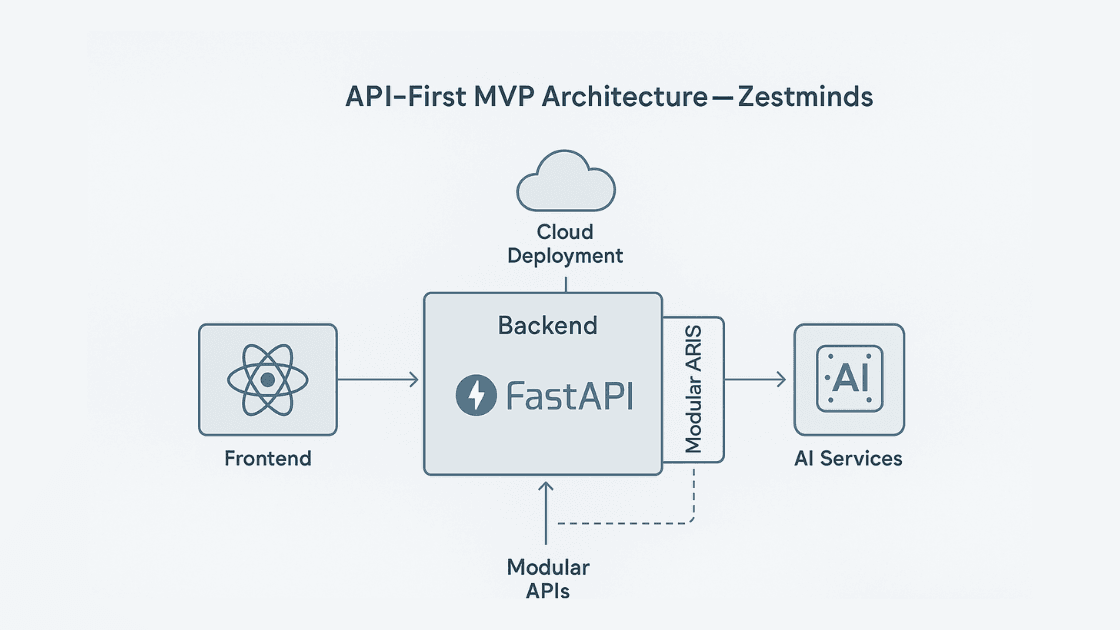
Red Flags to Watch Before You Sign
Here’s what experienced founders look for before saying "yes" to any MVP agency:
- Too good to be true timelines: "Two weeks for a full app" = trouble.
- Vague budgets: No milestone breakdown = hidden costs.
- No test environment: If there’s no staging URL, QA doesn’t exist.
- Ambiguous IP ownership: Your code, repo, and data must stay yours.
Still comparing? Read MVP Development for Startups – Build Smart, Spend Less for practical vendor scoring templates.
Case Study: When the Wrong Partner Cost 4 Months
A founder chose a "budget" agency that promised full delivery in six weeks. They missed demo day, lost funding, and spent $30 K fixing errors. When they came to Zestminds, we relaunched in half the time, with proper documentation and continuous deployment. Lesson: speed without structure is chaos in disguise.
Wrong Partner vs Right Partner
See how structured process and transparency transform outcomes.
| ❌ Wrong Partner | ✅ Right Partner |
|---|---|
|
Scattered sticky notes and ad-hoc planning. |
Centralized sprint board with visible tasks and timelines. |
|
Missed deadlines and unclear responsibilities. |
Predictable milestones and transparent accountability. |
|
Confused teams and last-minute firefighting. |
Aligned team collaboration with weekly demos. |
|
No testing or staging environment—bugs surface at launch. |
Continuous QA and testing in sandboxed environments. |
|
No documentation or ownership clarity post-launch. |
Detailed documentation, ownership transfer, and ongoing support. |
5. Strong Communication and Visibility
Transparency is the oxygen of product development. You don’t need daily meetings; you need daily visibility. Every founder should ask:
- Who’s my main point of contact?
- How are blockers and scope changes communicated?
- Do I get weekly sprint updates?
The best MVP partners behave like co-founders, proactive, clear, and candid. At Zestminds, founders see real-time progress via shared boards and weekly demos. We believe "no surprises" is the best project policy.
Analogy: The Air Traffic Tower
A founder without visibility is like a pilot flying through fog, fast, but directionless. Weekly demos are your radar; never take off without them.
Curious what transparent development looks like? Explore our MVP process at Zestminds, built for visibility, velocity, and trust.
6. Transparent Pricing and Milestone Clarity
"We’re 80 % done, just need more budget." If you’ve heard that line, you know the pain. A good partner gives you clarity before code. Every milestone should have deliverables, estimates, and a measurable outcome.
- Is QA included or billed separately?
- What happens if scope changes mid-sprint?
- How do they calculate revisions or design tweaks?
Founder Story: One client chose Zestminds’ milestone billing over cheaper hourly quotes. The result? They saved 40 % by pausing after MVP validation instead of being locked into a bloated contract. Predictability beats low price every time.
7. Post-MVP Scalability and Maintenance
Launch day isn’t graduation, it’s orientation. Your MVP should be designed to grow without breaking. Ask your vendor how they plan for scale, updates, and post-launch support.
- Do they plan for caching, monitoring, and CI/CD from day one?
- Will you own deployment credentials and runbooks?
- Do they offer an optional support retainer?
Mini Case: After one of our fitness-tech MVPs hit 10,000 users in month one, our scaling plan activated automatically, no downtime, no chaos. That’s what we mean by "built for momentum."
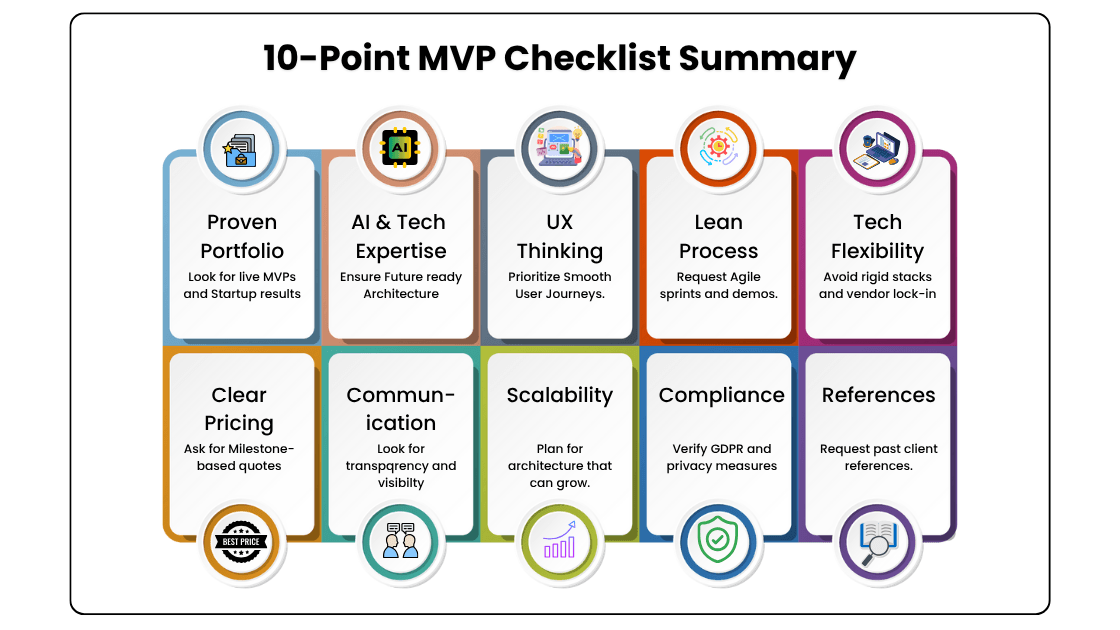
8. Data Protection and Compliance
Startups that ignore privacy don’t stay small, they just stay risky. Ensure your MVP complies with GDPR, CCPA, and India’s DPDP Act from day one. A compliant foundation prevents costly rewrites later.
- Cookies and analytics only after consent.
- Encrypted data at rest and in transit.
- Documented data deletion and access policies.
Insight: Compliance isn’t just legal, it’s emotional trust. At Zestminds, our code review process includes privacy checks inspired by real audit frameworks. Build safe, scale fast.
9. References, Reviews, and Social Proof
Real credibility doesn’t come from websites, it comes from voices. Talk to past clients. Ask for the project that didn’t go perfectly. You’ll learn more from that story than ten testimonials.
- Check platforms like Clutch or G2 for consistency.
- Ask: "Would you hire them again?" That’s the only metric that matters.
Story: A prospect once called two of our clients. They shared both highs and hurdles, and how our transparency resolved each. That honesty sealed the partnership before we even sent a proposal.
Bonus Tip: Test Before You Commit
If you’re unsure, run a two-week paid pilot. It’s like a first date, you’ll instantly see if there’s chemistry, communication, and competence. At Zestminds, many long-term partnerships started with pilots. We’d rather earn trust with results, not promises.
10. Final Thoughts: Build Smart. Learn Fast. Scale Confidently.
Your MVP isn’t your final product, it’s your most valuable experiment. Treat it as a compass, not a finish line. The right partner helps you navigate uncertainty, not amplify it.
In short:
- Pick experience over price.
- Prioritize clarity over complexity.
- Seek builders who think like co-founders.
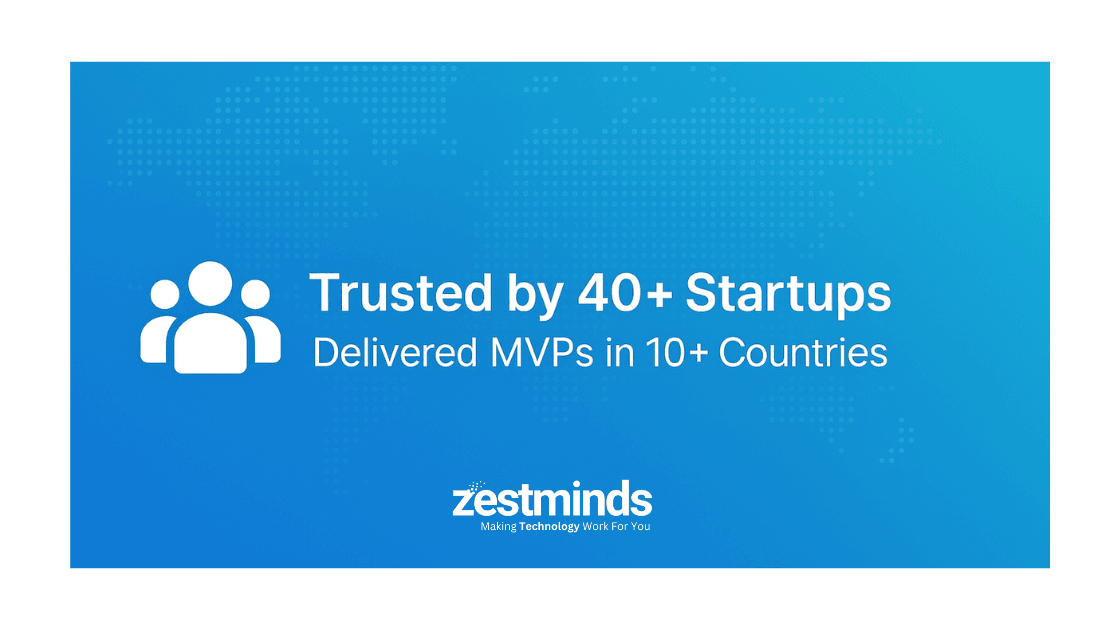
At Zestminds, we’ve helped founders across the US, UK, Europe, and Asia launch investor-ready MVPs in as little as 6–8 weeks, without cutting corners or confidence. Whether it’s a marketplace, AI workflow, or SaaS product, we build foundations that learn, adapt, and scale.
Ready to move from idea to insight? Start your MVP journey with Zestminds or see how we build MVPs in 6–8 weeks.
Founder FAQs
How much does it cost to build an MVP in 2025?
Budgets typically range between $15,000–$60,000 depending on complexity and design depth. The smarter path? Build lean, validate early, and reinvest learnings instead of rework.
How long should an MVP take?
Most MVPs are ready in 6–10 weeks with clear sprints, real demos, and founder-approved roadmaps. Complexity adds time, but not confusion when managed transparently.
What makes Zestminds different?
Zestminds blends startup speed with enterprise-grade structure. Every project includes milestone tracking, AI-ready architecture, and built-in compliance checks. Our process ensures your MVP is not just built, but funding-ready.
How do I choose the right MVP development company for my startup?
Start by evaluating live case studies, asking about sprint structure, and verifying post-launch support. The best MVP development company behaves like a co-founder, transparent, data-driven, and outcome-focused.
What is the difference between an MVP agency and hiring freelance developers?
An MVP agency offers a full team, PMs, UX designers, and backend engineers, working under one process. Freelancers may be cheaper but often lack sprint coordination, testing rigor, and long-term scalability planning.
How can I make sure my MVP is scalable after launch?
Plan for growth from day one. Ensure your vendor uses modular APIs, containerized deployment, and a cloud-first architecture (AWS, GCP, or Azure). Ask for load testing and performance benchmarks before final delivery.
What’s included in a standard MVP development process?
A robust process includes discovery workshops, wireframes, sprint-based coding, QA testing, analytics setup, and post-launch optimization. At Zestminds, founders get visibility across each stage through live dashboards and weekly demos.
How do I know if my MVP is investor-ready?
Your MVP is investor-ready when it proves traction with real users, clean data analytics, and a scalable codebase. Zestminds aligns each build with measurable KPIs so founders can pitch confidently with results, not slides.
Why is data compliance (GDPR, CCPA, DPDP) important for early-stage startups?
Because privacy builds trust. Non-compliance can block partnerships and funding. Ensure your MVP development services include consent-first tracking, encrypted data storage, and audit-ready documentation.
Table of Contents
- Why Choosing the Right MVP Partner Matters
- The 10-Point MVP Company Checklist
- Red Flags to Watch Before You Sign
- Strong Communication and Visibility
- Transparent Pricing and Milestone Clarity
- Post-MVP Scalability and Maintenance
- Data Protection and Compliance
- References, Reviews, and Social Proof
- Final Thoughts
- FAQs for Founders

Shivam Sharma
About the Author
With over 13 years of experience in software development, I am the Founder, Director, and CTO of Zestminds, an IT agency specializing in custom software solutions, AI innovation, and digital transformation. I lead a team of skilled engineers, helping businesses streamline processes, optimize performance, and achieve growth through scalable web and mobile applications, AI integration, and automation.
Stay Ahead with Expert Insights & Trends
Explore industry trends, expert analysis, and actionable strategies to drive success in AI, software development, and digital transformation.

